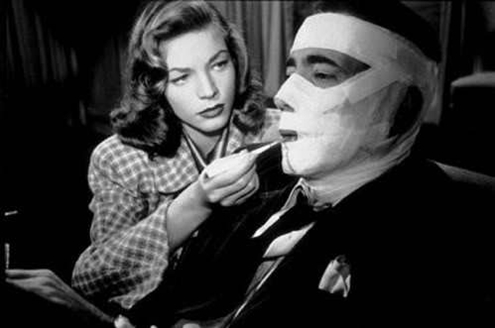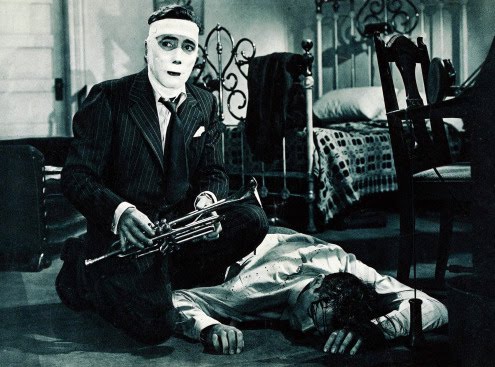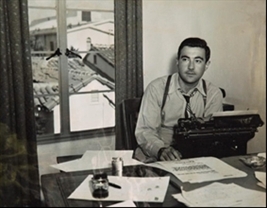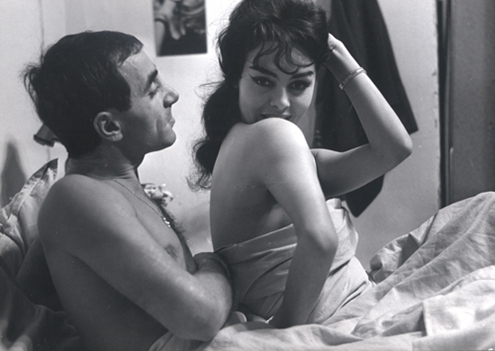By Film Noir Blonde and Mike Wilmington
The Noir File is FNB’s guide to classic film noir, neo-noir and pre-noir from the schedule of Turner Classic Movies (TCM), which broadcasts them uncut and uninterrupted. The times are Eastern Standard and (Pacific Standard).
PICKS OF THE WEEK
“Dark Passage” (1947, Delmer Daves). Friday, June 14: 8 p.m. (5 p.m.)
I recently wrote about 1947’s “Lady in the Lake,” a Raymond Chandler/Philip Marlowe tale, starring and directed by Robert Montgomery. Its chief claim to fame is the experimental subjective camera – the story is told entirely from Marlowe’s point of view.
In that review, I noted that “Dark Passage,” starring Humphrey Bogart and Lauren Bacall, also from 1947, uses a subjective camera as well, though just for the first half-hour of the movie. The limited use of the technique in “Dark Passage” pays off much better than the full-on treatment in “Lady.” Though “Dark Passage” wasn’t a huge hit in its day – audiences weren’t crazy about being deprived of Bogart – it’s a film noir treasure that rarely gets its due.
You can read the full FNB review here.
NOIR WRITERS SERIES: DAVID GOODIS
All this month on its Friday Night Spotlight screenings, TCM is presenting a series of classic film noirs, with each Friday night devoted to movies based on or written by (or both) one of six top-notch noir authors: Dashiell Hammett, Raymond Chandler, James M. Cain, David Goodis, Jonathan Latimer and Cornell Woolrich.
Tonight the spotlight is on David Goodis, one of the strangest and most poignantly self-destructive of the great film noir novelists. Goodis, a well-educated Philadelphian, and an outsider for most of his life, came to Hollywood when his best-selling novel, “Dark Passage” was sold to Warner Brothers as a vehicle for the red hot movie team of Humphrey Bogart and Lauren Bacall. “Dark Passage” allowed Bogie and Bacall to shine, and is now considered a classic.
But Goodis, who liked to explore the lower depths, proved too weird even for Movieland, and he soon returned East where he spent the rest of his relatively brief life (1917-1967) writing pulp novels for paperback publishers, which he occasionally sold to the movies. (See below.)
They were cheap, supposedly trashy books, churned out fast. Goodis filled them with a keen insight into darkness, loneliness and the underworld, a flair for strong perverse characterization and a poetic command of language few writers in his genre could match. “Dark Passage” remains his most famous novel. The most personal and revealing may be “The Burglar,” directed by his Philly friend Paul Wendkos. It’s a powerful film, but the book is better.
(The “Noir Writers” films, all of which show on Friday evening, June 14, were curated and will be introduced by film noir expert Eddie Muller.)
8 p.m. (5 p.m.): “Dark Passage” (See Above.)
10 p.m. (7 p.m.): “Nightfall” (1956, Jacques Tourneur). With Aldo Ray, Anne Bancroft and Brian Keith. Reviewed on FNB, May 29, 2012.
11:30 p.m. (8:30 p.m.): “The Burglar” (1957, Paul Wendkos). David Goodis’ eerie, haunting novel about a gang of burglars, inlcuding platonic lovers Dan Duryea and Jayne Mansfield, and how they come apart. The diretcor, Paul Wendkos (“The Mephisto Waltz”) was another Philadelphia guy and a friend of Goodis’, and he did very well by the book, which is one of the great pulp paperback novels of the ’50s. The movie isn’t on that level, but, in its way, it’s a neglected, if melancholy, gem.
1:15 a.m. (10:15 p.m.): “Shoot the Piano Player” (1960, François Truffaut). The greatest movie ever made from a David Goodis novel is also the ultimate fusion of film noir with the French New Wave. Noir-lover François Truffaut (“Jules and Jim”) takes one of Goodis’ best novels, “Down There,” resets it in a Paris dive, and comes up with melancholy black-and-white movie magic. Truffaut makes the material his own. He keeps the original tale of a concert pianist (legendary torch singer Charles Aznavour) who, heartbroken at the loss of his love, goes down there to the depths of show biz – tinkling the keys in a neighborhood bar, until, despite his best efforts, he falls in love again and falls in with criminals. Like most Goodis stories, it’s a bluesy tale touched with terror. But Truffaut opens it up with innovative filmmaking and breezy, saucy, seemingly off-the-cuff scenes that shoot vibrant life into a very dark subject.
Friday, June 14
2:15 p.m. (11:15 a.m.): “The Good Die Young” (1954, Lewis Gilbert). Crisp British heist film, guided by one of the better James Bond directors, Lewis Gilbert (“You Only Live Twice,” “The Spy Who Loved Me”), with a tremendous cast: Laurence Harvey, Gloria Grahame, Joan Collins, Richard Basehart, Stanley Baker, Margaret Leighton and John Ireland.
2:45 a.m. (11:45 p.m.): “The Burglars” (1972, Henri Verneuil). This is not the Wendkos-Goodis movie “Burglar” noted above, but a French remake, from skillful journeyman Henri Verneuil (“The Sicilian Clan”), co-starring Jean-Paul Belmondo, Dyan Cannon and Omar Sharif.
Sunday, June 16
![Bonjour Tristesse DVD[1]](http://www.filmnoirblonde.com/wp-content/uploads/2013/06/Bonjour-Tristesse-DVD1.jpg) 6 a.m. (3 a.m.): “Bonjour Tristesse” (1958, Otto Preminger). With Jean Seberg, Deborah Kerr and David Niven. Reviewed on FNB December 17, 2013.
6 a.m. (3 a.m.): “Bonjour Tristesse” (1958, Otto Preminger). With Jean Seberg, Deborah Kerr and David Niven. Reviewed on FNB December 17, 2013.
11:45 a.m. (8:45 a.m.): “Citizen Kane” (1941, Orson Welles). With Welles, Joseph Cotton, Everett Sloane and Dorothy Comingore. Reviewed on FNB July 7, 2012.
4 a.m. (1 a.m.): “12 Angry Men” (1957, Sidney Lumet). Twelve men, jurors in a murder trial, gather together in the sweltering heat of a New York City afternoon, in a box-like jury room, to decide the fate of a Puerto Rican boy accused of murdering his father. All of them seem convinced of the defendant’s guilt, except Juror No. 8 (Henry Fonda), who casts the sole “Not Guilty” vote, and then asks that they give the accused a last chance, examine the evidence one more time. (You can read Mike Wilmington’s complete review of “12 Angry Men” here.)














From FNB readers